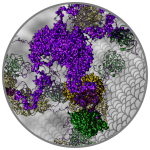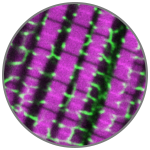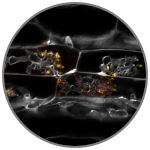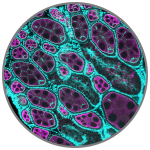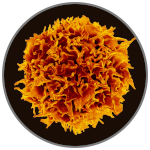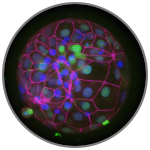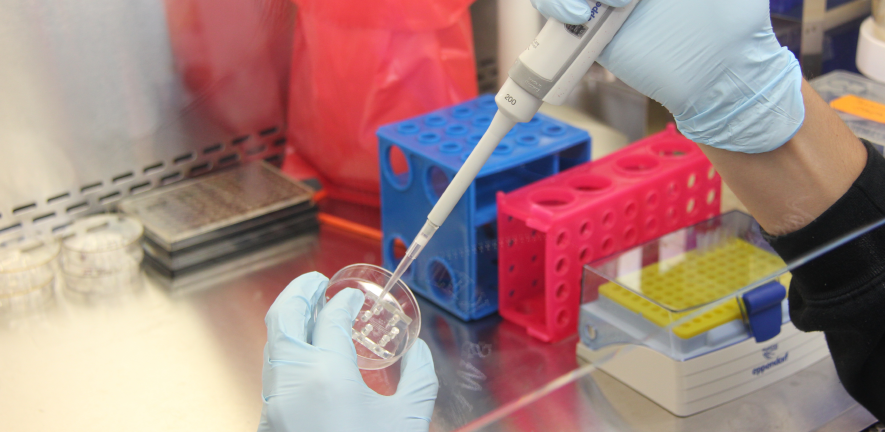
The MPhil in Biological Sciences by Advanced Study is a full-time programme offering students the opportunity to undertake a period of study and lab-based research in an area of scientific importance and interest. These include:
-
Biomolecular Science
-
Cell Science
-
Crop Science
-
Developmental Biology
-
Infection Biology and Molecular Immunology
-
Reproduction and Embryogenesis
At the heart of this new programme is a commitment to give more students the opportunity to experience the excitement of scientific research in one of the world’s leading research universities. We aim to bring together motivated students with different lived experiences, bridging the gap between less research-intensive undergraduate degrees and further postgraduate education. A year of in-depth research study, in a supportive environment, combines more specialised teaching with professional skills training. At the end of the Master’s course, students will be fully equipped for a wide range of careers, including advanced research in industry or to apply to any competitive doctoral programme.
You can find more information on the MPhil website. If you have any queries, please contact the MPhil Coordinator.
Biomolecular Science
Biomolecular science is the study of biological processes at the molecular level, whether within a cell, a tissue, a whole organism or an ecosystem. As such its concepts and experimental approaches are absolutely central to the whole range of present-day life sciences. Biomolecular science is a rapidly evolving field: in the technologies it exploits to understand life at the macromolecular level and in its conceptual advances that drive basic research and support biotechnology applications. By combining traditional areas of science to unravel how molecular machines execute biological processes, biomolecular science transcends boundaries between the single disciplines of biology, chemistry, physics, and computer science.
This MPhil aims to convey a comprehensive understanding of biological processes at the molecular level. We will discuss the major biological macromolecule families, including, DNA, RNA, proteins and lipids. We will explore the properties of biological membranes, biomolecular recognition, signalling and therapeutics. The understanding and application of advanced technologies are crucial to the advancement of biomolecular science and these will be explored in depth. Although we will not focus on specific diseases, the workshops and discussions will include relevant pathophysiological contexts, as understanding the molecular basis of disease will be imperative to developing innovations, from target-based therapeutics to agricultural applications. Find out more about the Biomolecular Science pathway and apply.
Cell Science
Cells are the fundamental functional units of life, from single celled organisms, such as bacteria, protozoa and fungi, to multi-cellular eukaryotes. Yet we still cannot claim that we understand cells well enough. Each cell has its own structural and functional features, engaged in complex communication with its immediate milieu and capable of plasticity. It is the behaviour, function and fate of cells that ultimately govern organismal state, both in physiological and pathological settings. Knowing how cells work informs our understanding of how the growing number of human disease genes can cause pathology. In this exciting time of technological innovation, the field is evolving rapidly, allowing us to extract a plethora of fine-grained information and to look into the cellular world with a holistic, interdisciplinary perspective.
This MPhil aims to convey a detailed understanding of a diverse range of biological processes, examined at the level of an intact cell as well as cell manipulations for biomedical applications. The topics covered include cellular organisation with in-depth insight into the structures and functions of key organelles, communication within and between cells, cell stress, cell fate (division, differentiation, regeneration and death) and cell therapy/regenerative therapeutics. As such the concepts and experimental approaches covered in this course are central to the full range of present-day life sciences. Although we will not focus on specific diseases, the workshops and discussions will often include relevant pathophysiological contexts to aid our understanding of disease mechanisms. Find out more about the Cell Science pathway and apply.
Crop Science
Global food security sits at a nexus. Do we continue with unsustainable practices benefiting farmers in high and middle income countries, while small-holders barely produce enough to support themselves? Or can we find a new way for agriculture that delivers food in an equitable and sustainable manner? Envisioning agriculture in 2050 needs to take into account the global population, the planets’ biodiversity, global climate change and the current inequities in the system.
The MPhil in Crop Science will explore new ways of thinking about what agriculture should be in 2050 and how we might get to that point. We will take a broad view of potential solutions, with an emphasis on practical, scientific approaches, from genetic engineering to regenerative agriculture. Field-based study is made possible through our partnership with the National Institute for Agricultural Botany (NIAB). Our aim is to train future leaders to take creative approaches to global food security.
A major theme of the course will be connecting knowledge across scales to provide the students with an integrated perspective on food security that spans plant biology, global ecology, conservation and economics. Find out more about the Crop Science pathway and apply.
Developmental Biology
Developmental biology is a remarkably cross-disciplinary area of biomedical research that spans traditional departmental boundaries and many different technologies, such as molecular biology, genetics, epigenetics, cell and stem cell biology, imaging and bioinformatics. This field is increasingly significant in the era of readily available genome sequences, because functional studies of development are essential to decipher the roles of many genes, and will be invaluable if we are to reap the benefits of this wealth of new information. A major challenge now is to find more powerful, systematic and quantitative ways of investigating how this genetic information is translated into morphogenetic instructions, and to analyse how these instructions generate and are modulated by the forces that shape tissues and organs. This course embraces the challenge and offers a powerful opportunity to explore processes and mechanisms across a range of developmental model systems. Find out more about the Developmental Biology pathway and apply.
Infection Biology and Molecular Immunology
The COVID-19 pandemic dramatically illustrated how understanding the biology of infectious agents and of the host immune system is fundamental to human health and prosperity. Our knowledge of infection and immunity is increasing at a rapid rate, opening opportunities for new therapies, new vaccines, and a better understanding of disease emergence that will help safeguard human health and food security in the 21st century. The Infection Biology & Molecular Immunology MPhil is specifically targeted at providing advanced training in the experimental skills and theoretical concepts that underpin modern infection biology and molecular immunology research. Find out more about the Infection Biology and Molecular Immunology pathway and apply.
Reproduction and Embryogenesis
Reproduction has broad relevance because of the way it impacts individuals, families, and populations, and because it raises discussions that span in scope from intimate experiences through to global health policies. Why do so many couples struggle with achieving a healthy pregnancy and why do babies and women still die globally during pregnancy and childbirth? How can we prevent these tragedies from happening? How can we use new discoveries about epigenetics and the developmental origins of diseases to ensure the best health outcomes for future generations? How will novel technologies and changes in the legal frameworks make parenthood more accessible to those who have traditionally been excluded? Is it possible to use germline genome editing – which has the potential to prevent babies from inheriting life-limiting diseases – in a safe and ethical manner? What can we learn about the future of reproduction by studying its history?
Finding answers to major questions like these requires informed input from diverse disciplines. The MPhil in Reproduction and Embryogenesis aims to provide comprehensive training in gametogenesis, reproduction, embryogenesis and feto-placental physiology through interdisciplinary taught modules and conducting innovative research projects with the leaders in the field. The course takes a multidisciplinary approach to reproduction through various complementary perspectives and disciplines, including historical, legal, and sociological aspects along with molecular and clinical sciences. Find out more about the Reproduction and Embryogenesis pathway and apply.

